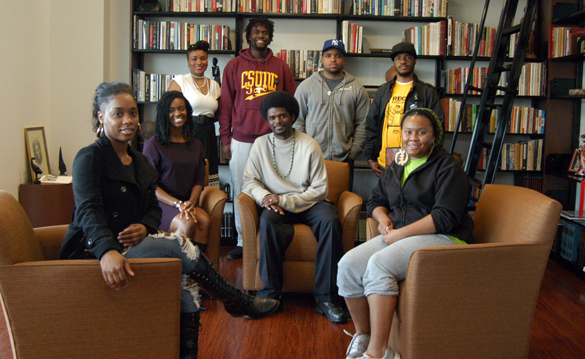Faculty and students from the Department of Africana Studies at California State University, Dominguez Hills attended the 35th Annual National Council for Black Studies (NCBS) Conference held in Cincinnati, Ohio, in March. Through a variety of forums and presentations, the conference provided opportunities to exchange ideas, network and learn the latest scholarship in the field.

For undergraduate students from CSU Dominguez Hills, the NCBS conference afforded an opportunity to do graduate-level research on major issues in the African and African Diasporic communities and present it to a world-class audience of peers and academics. Ricco Garrett (senior, Africana studies), presented “The Mission Statements of the Black Mega Church in the 21st Century. Kristecia Estem (senior, health science major with a concentration in community health, Africana studies minor) spoke about “HIV, Culturally (Ir)Relevant Interventions, and African American Men.” Adrienne McKinney (junior, sociology major, Africana studies minor) presented “Re-Conceptualizing Black/Africana Church Pedagogy: An Investigation on How Current Methods Discount the Critical Process.” Darol Kay (junior, Africana studies major), discussed “Revisiting Carter G. Woodson: Toward a Critical Education Theory” and David Turner (sophomore, Africana studies and English, double major) shared his findings on “The Pursuit of Higher Education Amongst African American Males: A Case Study of Inglewood Unified School District.”
Turner, who is in the English department’s rhetoric and composition certificate program, said that the experience “definitely built my confidence in my scholarly pursuits and I’m sure it did the same for my colleagues.” His research revealed a lot about the outside influences of family, community programs, and supplemental programs by high schools on encouraging young men to go to college. He looks forward to becoming an English teacher at the high school and/or university level, and propelling the next generation to higher education.
“I’ve always had dreams of teaching. I see education as my venue to help create consciousness, of being aware of your environment, how you navigate your environment, and how you have to change that environment. I see education as the way to do it,” said Turner.
Graduate student Charmaine R. Lang (interdisciplinary studies major with a concentration in African world literature and rhetoric) said that she appreciated the fact that the conference’s theme of “Healthy Minds, Spirits and Bodies” helped to illustrate the fact that the black community faces the same issues whether in the United States or around the world, such as standards of female beauty.
“Many of our presentations were on contemporary issues and concerns in the black community and also ways that we can address them and rectify them. Some of the panels I went to were [on] some of the conflicts that black women have with [their] hair,” said Lang. “It was interesting to see that other people have some of [the same] concerns here. It just shows you the interconnectedness of our communities.”
Panelists for “The Teaching Practice of Africana Literature and Aesthetics” included Africana studies adjunct lecturer Jalondra Davis, who presented this talk with Lang and alumnus Jimmy Kirby, Jr. (Class of ’05, B.A., Africana studies), who is currently a doctoral student at Temple University in Philadelphia. Davis said that their discussion emphasized “encouraging and developing student agency, and seeing students not simply as receptacles to be… filled with information, but making them partners in the [learning] process.”
The high standards set by faculty in the Africana studies program at CSU Dominguez Hills were evident during the conference, says Maurice Keith Claybrook, Jr., lecturer, Africana studies.
“All but one of our students are undergraduates,” Claybrook says. “However, in my conversation with conference participants, they believed that our students were graduate students based on the level of their scholarship and the way in which they represented CSU Dominguez Hills and the Africana studies department.”
Claybrook mentored students and presented two papers, “Black Power, Black Students, and the Institutionalizing of Change: Loyola Marymount University, 1968- 1978” and “Intergroup Attitudes: African American and Latino Students at a Multicultural Center.” He also chaired two panels, “Gender, Community Health, and Popular Culture: Examining Psycho-social and Physical Factors Impact on Critical Issues in the Community” and “Reassessing and Revisiting Educational Theories and Approaches: Implications for African Americans and Beyond.”
Dr. Rudy Vanterpool, acting chair of Africana studies, presented “Alain Locke’s Account of Aesthetics and Race Theory: Whose Art? Whose Representation?” Dr. Munashe Furusa, member of the NCBS Executive Board, former chair of Africana studies, and current acting associate dean of the College of Arts and Humanities, mentored students, chaired a student panel, and was part of three round table sessions, “Program Assessment and Review,” “Tenure and Promotion” and “The Beat of a New Drum: The First Year Experiences of Black Studies Chairs in the World of Administration.”
Attendance at the conference is a practice that was initiated by the late Dr. William Little, former Africana studies chair and former NCBS president. According to Furusa, up to ten students annually have been able to attend national conferences in part because of funds provided by Dr. Little prior to his passing in 2008, and subsequently by his widow, Monica M. Little, Esq.
“Dr. Little was instrumental in developing Africana studies student research and presentation skills. To this end, his mentoring and nurturing took students to the NCBS conference to provide them with the opportunity to gain academic conference experience, by allowing them to present their scholarship, and network with scholars and student peers from around the world,” said Claybrook. “We have continued in Dr. Little’s legacy to meet the motto of the Africana studies department, ‘A Place Where Scholars, Thinkers and Leaders are Nurtured.’”
For more information on the National Council of Black Studies, click here.
For information about the Department of Africana Studies, click here.
– Additional reporting by Joanie Harmon